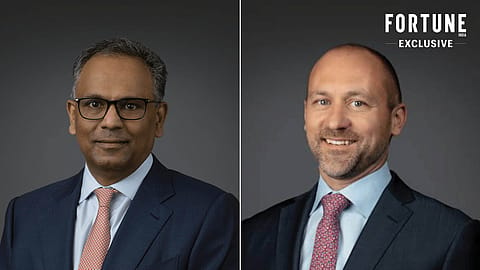Exclusive: GQG Partners may face potential investor exodus on Adani impact
Rajiv Jain and CEO Tim Carver, who collectively have over $1 billion invested in GQG strategies, are deeply entangled in the fallout

In a dramatic turn of events, GQG Partners, a boutique asset management firm hailed for its aggressive investment strategies, finds itself grappling with a crisis of confidence. This follows the indictment of Gautam Adani, chairman of the Adani Group, and seven associates by U.S. prosecutors for alleged bribery and fraud involving $250 million. The scandal casts a dark shadow over GQG’s significant stakes in Adani-linked companies, raising fears of substantial investor outflows.
GQG Partners, under the leadership of its chief investment officer Rajiv Jain, had embraced a bold and controversial strategy in 2023, allocating nearly one-fifth of its Emerging Markets Equity Fund to Adani group companies. Reports mention that as per LSEG data, the fund holds 19.37% combined stake across Adani Enterprises, Adani Power, Adani Green Energy, and Adani Energy Solutions, representing a significant portion of GQG's $33.6 billion Emerging Markets portfolio. The EM fund collectively owns 8.18% Adani Ports & Special Economic Zone, Adani Enterprises, Adani Green, Adani Power, and Adani Energy Solutions.
GQG Partners held assets worth $564.8 million as of June 30, 2024, including $240.8 million in current assets, even as its cash reserves increased to $104.8 million, up from $64.9 million at the end of 2023. In fact, the firm paid $167.8 million in dividends and RSU dividend-equivalents to investors in the first half of 2024, alongside completing the acquisition of minority interests in three private equity boutique investments on May 17, 2024.
In the firm’s 2023 annual report, Jain had defended the move, citing it as a prime example of GQG’s "differentiated thinking" and adaptability. He characterised the investment as a strategic opportunity to capitalise on undervalued assets amidst negative media coverage. The gamble seemed to pay off initially, contributing to an impressive 21% outperformance of the Emerging Markets strategy relative to its benchmark. However, the indictment has drastically altered the narrative.
The indictment's aftermath has been unforgiving for GQG Partners. On the Australian Securities Exchange, the stock plummeted by over 23% to AUD 2.03, marking its worst trading day since its listing in 2021. At the time of writing the report, the stock had recovered to AUD 2.13, reflecting a decline of 19.32%.
The dramatic sell-off underscores the market’s fears of reputational damage and potential client withdrawals, given that institutional investors comprise a significant portion of GQG's clientele and are reportedly reevaluating their positions. These clients, including pension funds and sovereign wealth funds, are particularly sensitive to allegations of corruption and governance issues tied to their investment portfolios.
The U.S. indictment accuses Adani and his associates of orchestrating a bribery scheme to secure government contracts, including India’s largest solar power project, projected to generate $2 billion in profits over two decades. These allegations compound previous concerns raised by Hindenburg Research, which accused the Adani Group of accounting irregularities and stock manipulation earlier in 2023.
Recommended Stories
Damage Control
In a statement, GQG Partners acknowledged the severity of the situation, emphasising that its team was "reviewing the emerging details and determining what, if any, actions for our portfolios are appropriate."
Despite its historical emphasis on adaptability and a strong balance sheet, the firm faces mounting pressure to demonstrate decisive action to mitigate risks. GQG’s revenue model, heavily reliant on management fees tied to Funds Under Management (FUM), underscores the stakes. With $155.6 billion in FUM as of June 2024, the prospect of significant outflows could disrupt its recent financial momentum. In the first half of 2024, GQG reported a 53.1% increase in net revenue, driven by strong client inflows and growing average management fees. This trajectory is now under threat.
Jain’s leadership and investment philosophy have been central to GQG’s identity and growth. His commitment to "constructing portfolios that look quite different relative to our peers" has delivered exceptional results in the past. Yet, this same approach now faces criticism for exposing the firm to outsized risks.
(INR CR)
Jain and CEO Tim Carver, who collectively have over $1 billion invested in GQG strategies, are deeply entangled in the fallout. Their personal stakes in the firm highlight the gravity of the situation, both for the business and its leadership.
Potential Fallout
The unfolding scandal raises urgent questions about GQG’s ability to retain investor confidence. The firm’s focus on building concentrated, active portfolios, while a hallmark of its strategy, is now a double-edged sword. With Adani-linked investments under intense scrutiny, GQG’s reliance on these holdings could lead to substantial outflows.
Institutional investors may demand greater transparency and a reassessment of the firm’s risk management practices. Meanwhile, retail investors, who have flocked to GQG for its differentiated returns, may reconsider their trust in a firm entangled in one of the largest corporate scandals of recent times.
GQG Partners’ future hinges on its ability to navigate this crisis with transparency and agility. The firm’s recent growth, fuelled by robust net inflows and a sustainable fee structure, will be tested as it confronts the fallout from its high-stakes bet on the Adani Group.
“It is only in being different that we can provide differentiated returns, which I think reflects the team’s differentiated thinking, diligent work, and moral courage this year. It has clearly benefitted our clients and shareholders,” Jain had stated in the 2023 report.
For a firm built on the promise of "forward-looking quality," the coming months will determine whether it can uphold its reputation and retain its position as a rising star in the asset management industry or become a cautionary tale of overreach and misplaced confidence.